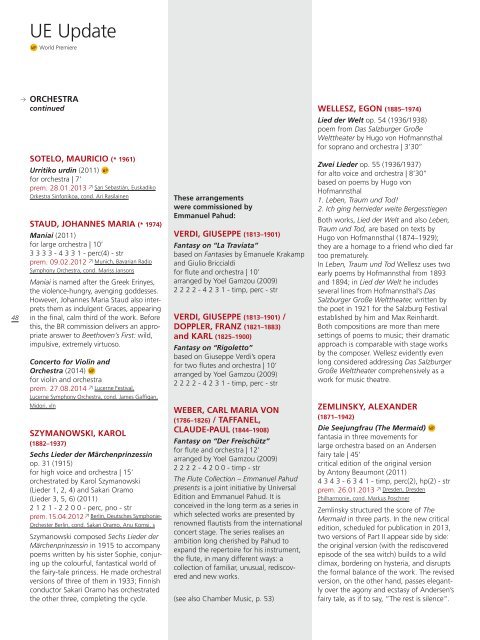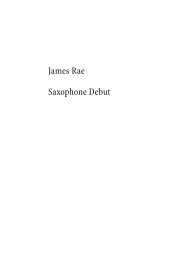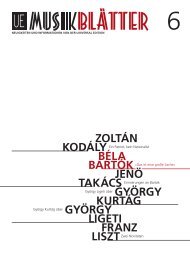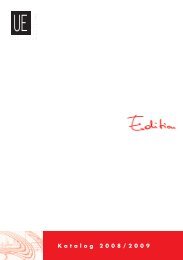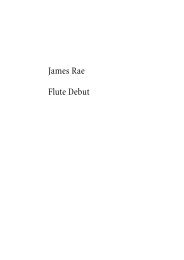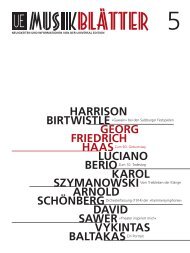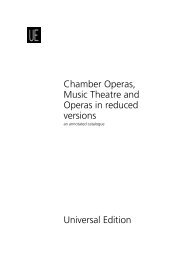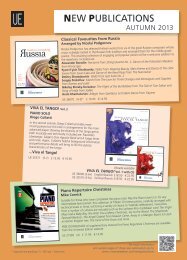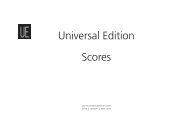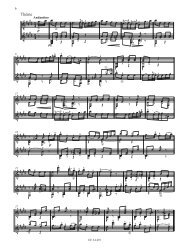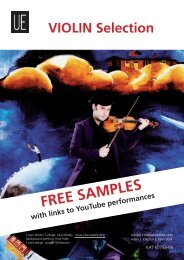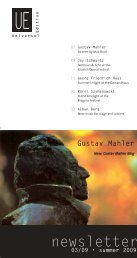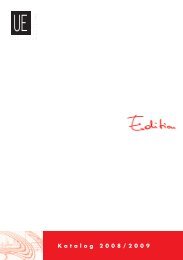Download a PDF file - Universal Edition
Download a PDF file - Universal Edition
Download a PDF file - Universal Edition
You also want an ePaper? Increase the reach of your titles
YUMPU automatically turns print PDFs into web optimized ePapers that Google loves.
UE Update<br />
World Premiere<br />
ORCHESTRA<br />
continued<br />
WELLESZ, EGON (1885–1974)<br />
Lied der Welt op. 54 (1936/1938)<br />
poem from Das Salzburger Große<br />
Welttheater by Hugo von Hofmannsthal<br />
for soprano and orchestra | 3’30’’<br />
48<br />
SOTELO, MAURICIO (* 1961)<br />
Urritiko urdin (2011)<br />
for orchestra | 7’<br />
prem. 28.01.2013<br />
San Sebastián, Euskadiko<br />
Orkestra Sinfonikoa, cond. Ari Rasilainen<br />
STAUD, JOHANNES MARIA (* 1974)<br />
Maniai (2011)<br />
for large orchestra | 10’<br />
3 3 3 3 - 4 3 3 1 - perc(4) - str<br />
prem. 09.02.2012 Munich, Bavarian Radio<br />
Symphony Orchestra, cond. Mariss Jansons<br />
Maniai is named after the Greek Erinyes,<br />
the violence-hungry, avenging goddesses.<br />
However, Johannes Maria Staud also interprets<br />
them as indulgent Graces, appearing<br />
in the final, calm third of the work. Before<br />
this, the BR commission delivers an appropriate<br />
answer to Beet hoven’s First: wild,<br />
impulsive, extremely virtuoso.<br />
Concerto for Violin and<br />
Orchestra (2014)<br />
for violin and orchestra<br />
prem. 27.08.2014 Lucerne Festival,<br />
Lucerne Symphony Orchestra, cond. James Gaffigan,<br />
Midori, vln<br />
SZYMANOWSKI, KAROL<br />
(1882–1937)<br />
Sechs Lieder der Märchenprinzessin<br />
op. 31 (1915)<br />
for high voice and orchestra | 15’<br />
orchestrated by Karol Szymanowski<br />
(Lieder 1, 2, 4) and Sakari Oramo<br />
(Lieder 3, 5, 6) (2011)<br />
2 1 2 1 - 2 2 0 0 - perc, pno - str<br />
prem. 15.04.2012 Berlin, Deutsches Symphonie-<br />
Orchester Berlin, cond. Sakari Oramo, Anu Komsi, s<br />
Szymanowski composed Sechs Lieder der<br />
Märchenprinzessin in 1915 to accompany<br />
poems written by his sister Sophie, conjuring<br />
up the colourful, fantastical world of<br />
the fairy-tale princess. He made orchestral<br />
versions of three of them in 1933; Finnish<br />
conductor Sakari Oramo has orchestrated<br />
the other three, completing the cycle.<br />
These arrangements<br />
were commissioned by<br />
Emmanuel Pahud:<br />
VERDI, GIUSEPPE (1813–1901)<br />
Fantasy on “La Traviata“<br />
based on Fantasies by Emanuele Krakamp<br />
and Giulio Briccialdi<br />
for flute and orchestra | 10’<br />
arranged by Yoel Gamzou (2009)<br />
2 2 2 2 - 4 2 3 1 - timp, perc - str<br />
VERDI, GIUSEPPE (1813–1901) /<br />
DOPPLER, FRANZ (1821–1883)<br />
and KARL (1825–1900)<br />
Fantasy on “Rigoletto”<br />
based on Giuseppe Verdi’s opera<br />
for two flutes and orchestra | 10’<br />
arranged by Yoel Gamzou (2009)<br />
2 2 2 2 - 4 2 3 1 - timp, perc - str<br />
WEBER, CARL MARIA VON<br />
(1786–1826) / TAFFANEL,<br />
CLAUDE-PAUL (1844–1908)<br />
Fantasy on “Der Freischütz”<br />
for flute and orchestra | 12’<br />
arranged by Yoel Gamzou (2009)<br />
2 2 2 2 - 4 2 0 0 - timp - str<br />
The Flute Collection – Emmanuel Pahud<br />
presents is a joint initiative by <strong>Universal</strong><br />
<strong>Edition</strong> and Emmanuel Pahud. It is<br />
conceived in the long term as a series in<br />
which selected works are presented by<br />
renowned flautists from the international<br />
concert stage. The series realises an<br />
ambition long cherished by Pahud to<br />
expand the repertoire for his instrument,<br />
the flute, in many different ways: a<br />
collection of familiar, unusual, rediscovered<br />
and new works.<br />
(see also Chamber Music, p. 53)<br />
Zwei Lieder op. 55 (1936/1937)<br />
for alto voice and orchestra | 8’30’’<br />
based on poems by Hugo von<br />
Hofmannsthal<br />
1. Leben, Traum und Tod!<br />
2. Ich ging hernieder weite Bergesstiegen<br />
Both works, Lied der Welt and also Leben,<br />
Traum und Tod, are based on texts by<br />
Hugo von Hofmannsthal (1874–1929);<br />
they are a homage to a friend who died far<br />
too prematurely.<br />
In Leben, Traum und Tod Wellesz uses two<br />
early poems by Hofmannsthal from 1893<br />
and 1894; in Lied der Welt he includes<br />
several lines from Hofmannsthal’s Das<br />
Salzburger Große Welttheater, written by<br />
the poet in 1921 for the Salzburg Festival<br />
established by him and Max Reinhardt.<br />
Both compositions are more than mere<br />
settings of poems to music; their dramatic<br />
approach is comparable with stage works<br />
by the composer. Wellesz evidently even<br />
long considered addressing Das Salzburger<br />
Große Welttheater comprehensively as a<br />
work for music theatre.<br />
ZEMLINSKY, ALEXANDER<br />
(1871–1942)<br />
Die Seejungfrau (The Mermaid)<br />
fantasia in three movements for<br />
large orchestra based on an Andersen<br />
fairy tale | 45’<br />
critical edition of the original version<br />
by Antony Beaumont (2011)<br />
4 3 4 3 - 6 3 4 1 - timp, perc(2), hp(2) - str<br />
prem. 26.01.2013 Dresden, Dresden<br />
Philharmonie, cond. Markus Poschner<br />
Zemlinsky structured the score of The<br />
Mermaid in three parts. In the new critical<br />
edition, scheduled for publication in 2013,<br />
two versions of Part II appear side by side:<br />
the original version (with the rediscovered<br />
episode of the sea witch) builds to a wild<br />
climax, bordering on hysteria, and disrupts<br />
the formal balance of the work. The revised<br />
version, on the other hand, passes elegantly<br />
over the agony and ecstasy of Andersen’s<br />
fairy tale, as if to say, “The rest is silence”.


